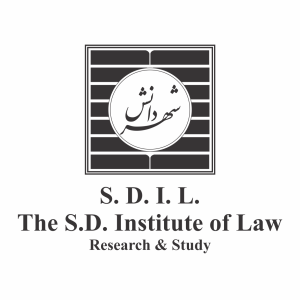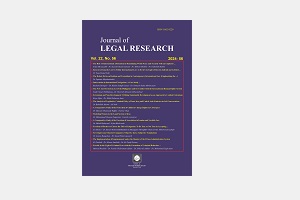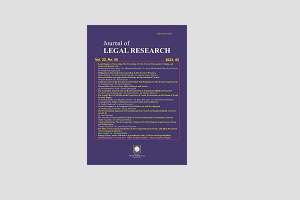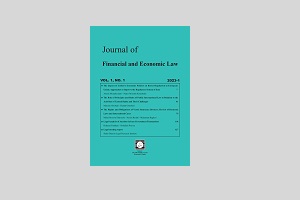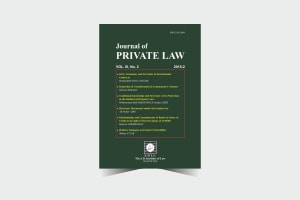Journal of
Legal Research
Number 11
Vol. VI No. 1
Spring – Summer 2007
Managing Editor: Vahid Eshtiagh
Editor-in-Chief: Seyyed Ghasem Zamani
CONTENTS
Articles
Tendency to Accept Corporations Criminal Liability, an Inevitable Realistic Response to the Effects Arising by Developing Economy
Vahid Eshtiagh (Ph.D.)
Rule of Laws or Politics: Analysis of the UN Security Council Resolution 1747 on Iran’s Peaceful Nuclear Program
Nader Saed (Ph.D.)
The Apply of Self-Defence for Combating Terrorism
Abbas Kadkhodaee (Ph.D.) & Shahram Zarneshan
The Issue of Constitutionalization of the Legal Order
Javad Taghizadeh (Ph.D.)
Insurance of Dowry
S. Morteza Ghasemzadeh (Ph.D.)
The Responsibility of Offender to Pay Treatment Charges Exceeding the Amount of Diah
Mohammad Mosaddegh
Analysis of Mandatory participation of the Executive Branch in Legislation-making Process in Iran’s law
Parvneh Tila
Special Issue: Legal Aspects of Reproductive and Therapeutic Cloning
Legal and Moral Aspects of Cloning
Farhad Emam
Human Dignity and Reproductive Cloning
Mohammad Musazadeh
Different Bases for Prohibiting Human Reproductive Cloning
Mostafa Elsan
Challenges of Therapeutic Cloning
Habib-ollah Rahimi (Ph.D.)
UN Criminal Policy against Human Cloning
Mohammad Ja’far Saed
Critique and Presentation
A Critique on Some Stipulations of the New Act for Administrative Court of Justice
International and Public Law Research Group of SDIL
Reflections on Article 18 of the Amended Act for Formation of Public and Revolutionary Court
Ghodrat-ollah Vahedi (Ph.D.)
Articles
Tendency to Accept Corporations Criminal Liability, an Inevitable Realistic Response to the Effects Arising by Developing Economy
Vahid Eshtiagh (Ph.D.)
Abstract:
In our days, corporations have dominated more economic and social activities. The idea of applying criminal law to corporate entities emerged in some developed countries as a response to the effects of development during last two centuries but particularly in two last decades. The present article studies the position of the criminal liability of corporations in Iran and corroborative and obstructive reasons and finally has considered it as a right and necessary reaction to the effects of the current economic, social, political and cultural development.
Keywords: Crime, Criminal Liability, Corporation, Criminal Sanctions, Corporation Crimes.
Rule of Laws or Politics: Analysis of the UN Security Council Resolution 1747 on Iran’s Peaceful Nuclear Program
Nader Saed (Ph.D.)
Abstract:
International law students advocate the separate and sui generis existence of this legal rules against any political intents, and analyzes practice of states and international institutions in the light of international rule of law and legal order, so that public order in the international community depends essentially on respect for the legal order. Then, they expect that the UN in particular, its executive organ, Security Council (SC), should have carried out it responsibilities in accordance with the law, and regulated its agenda for achieving the UN purpose in the light of legal obligations of international actors. However, the practice had a different situation. Throughout the SC’s activities on Iran’s nuclear program, political considerations of the certain members have been prevailed and the law on maintenance of international peace and security often were inferior. In this article, we analyze the relationships between international politics and decisions of the SC in particular, res. 1747 (2007). The open-ended question is that: is peaceful and promptly resolution of this crisis, the concrete intent of the SC? The Author believes that national interests of certain members of the SC have impeded the rule of international law governing resolution of this crisis.
Keywords: International law, Nuclear program, Iran, Security Council, Resolution 1747 (2007).
The Apply of Self-Defence for Combating Terrorism
Abbas Kadkhodaee (Ph.D.) & Shahram Zarneshan
Abstract:
Self-defence is one of the most important exceptions to the principle of prohibition of use of force. For many years, has been objected by the opinions that claim basic changes on the terms of exercise of this right. The global reaction as well as the United States to 11 September 2001 attacks confirms this claim. But the International Court of Justice has, clearly, considered the “occurrence of an armed attack by a state” as an essential term for the applying the right of self-defence, but this term dose not exists in terrorism attacks.
Keywords: self-defence, use of force, terrorism, armed attack, 11 September events, resolution 1368, international court of justice.
The Issue of Constitutionalization of the Legal Order
Javad Taghizadeh (Ph.D.)
Abstract:
Constitutionalization is a process of change and evolution which is created through the effect of constitutional norms on various branches of law and as a result of integration of these norms into the legal order as a whole. Conditions for realization of constitutionalization of the legal order are as follows: Normativity of the Constitution, Interventionism of the Constitution, Creation of a Constitutional Justice, and Diffusion of Constitutional Norms in the Legal Order. Also, important effects of constitutionalization on the legal order are: Constitutional Regulation of Political and Social Life, Constitutional Guarantee of Rights and Freedoms, Purification of the Legal Order of Non-Democratic Norms, and Progressive Unification of various branches of law.
Keywords: Constitution, Constitutional Norms, Constitutionalization, Legal Order.
Insurance of Dowry
S. Morteza Ghasemzadeh (Ph.D.)
Abstract:
Fixing of the amount of marriage portion depends upon the mutual consent of the marrying parties, but it may be unpaid able by husband if dowry has been fixed very much. Insurance of dowry is a reasonable mechanism which can be used as guaranty for payment of dowry to the wife.
Keywords: Marriage, Dowry, Insurance, Contract, Obligation, Liability.
The Responsibility of Offender to Pay Treatment Charges Exceeding the Amount of Diah
Mohammad Mosaddegh
Abstract:
In our country, the thousands of accidents are occurred every day and the thousands of people are hereby injured. In order to treat the injured persons, many act of cure must be done in the hospitals and the charges are relatively considerable. According to statistics, about 40% of judgments of the criminal courts referred to the Department of the execution of judgments concern the Diah (a fixed amount of money to be paid by the offender to the victim).
Since the adoption of Diat Act in 1982, an essential question has been always brought up: Can a judge order the offender to pay charges relating to the treatment of the victim, when these charges exceed the fixed amount of money determined by law, called Diah? To this question, there is no clear response in the legislation and the courts have not ruled in the same way. Therefore, we have tried to find an answer to the said question in light of Islamic law, the general principles of law and the Iranian laws and regulations.
Keywords: Offender, Diah, Victim, Islamic Law, Diat
Analysis of Mandatory participation of the Executive Branch in Legislation-making Process in Iran’s law
Parvneh Tila
Abstract:
In accordance with the separation of powers principle, legislation-making is the central and ultimate function of the legislature or parliament. Then, his function is not only an opportunity in which parliament members can evaluate and adopt any legislation proposals (Tarh or Laiehe), but also a situation to carry out the primary duty for passing new laws on new social problems. Reasonable expectation is that the parliament undertakes the major role of legislation-making throughout the initiation or suggestion to assessment and adoption. Therefore, participation of the executive branch and any other organ in this process is a voluntary function to help and complement that role. However, the common practice of the Majlis is that it can impose an obligation about initiatives or proposals by the executive branch (Dolat) to making new legislations imperatively on the certain and
admitted problems of the society. This article analyzes the concept of mandatory legislation initiative or participation of the executive branch in law-making process in light of I.R. of Iran’s constitution and cooperative model of the separation of powers.
Keywords: legislation-initiative, executive branch, legislation-acing, separation of powers, cooperative separation of powers.
Legal and Moral Aspects of Cloning
Farhad Emam
Abstract:
Cloning as Biotechnology has many legal and ethical aspects. In studying the ethics of gene therapy, one should make a distinction between therapy on the somatic (non reproductive) cells and the germ (reproductive) cells of an individual. In the present article, definitions of cloning and its using in research and curing of diseases has been studied. This paper primarily deals with the legal and moral aspects of cloning.
Keywords: Cloning, Biotechnology, Gen Therapy, Reproductive Cloning, Law.
Human Dignity and Reproductive Cloning
Mohammad Musazadeh
Abstract:
One of the essential challenges of reproductive cloning is its contradiction with human dignity. These are two main questions; first, does the production or use of human embryos in research threaten human dignity? And second, might therapeutic cloning lead to a commercialization of human eggs or embryos? It appears that reproductive cloning is not contradiction with human dignity in any case and absolutely.
Keywords: Human Dignity, Reproductive Cloning, Cloning, Human Rights.
Different Bases for Prohibiting Human Reproductive Cloning
Mostafa Elsan
Abstract:
At a general glance, cloning has divided to reproductive and therapeutic. Uncertainty in scientific aspects of cloning has induced a consensus in banning these techniques for reproduction of human being. In this paper, after a summary on the concept of cloning, ethical, philosophical, sociological and legal reasons for hypothesis of “Cloning Prohibition” has analyzed. Foundational supposition of this paper is: “stop cloning even if it is justified scientifically”.
Keywords: Cloning, Ethical Rules, Human Rights, Public Policy, Society, Culture.
Challenges of Therapeutic Cloning
Habib-ollah Rahimi (Ph.D.)
Abstract:
Although in many countries and international instrument reproductive cloning is prohibited, recent advances in stem-cell research hold promise for therapeutic uses. If stem-cell research were allowed to develop further, advances in this field could ensure of numerous human diseases. It appears that therapeutic cloning can be justified in Iranian law.
Keywords: Cloning, Reproductive Cloning, Therapeutic Cloning, Islamic Law, Iranian Law.
UN Criminal Policy against Human Cloning: Preliminary Considerations
Mohammad Ja’far Saed
Abstract:
Cloning is a modern and complex phenomenon resulting in growth of science and technology, in particular, growth of genetic science, which has faced the human society to hope and fear wave by its consequences, especially, thought of its implementing about human being. This new phenomenon which has given in the human world to two goals, reproductive and therapeutic, has promoted the thinkers and experts in various sciences to take some measures against it. In this essay, it is considered to international criminal policy (by focusing on United Nations) against it as a criminal phenomenon (crime).
Keywords: Cloning, Reproductive Cloning, Therapeutic Cloning, Embryo splitting, Criminalization, Criminal policy.
